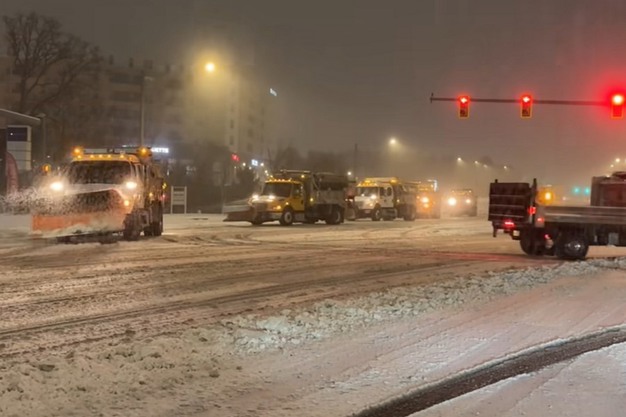The winter storm that has affected millions of people across the U.S. has also impacted the regular movement of produce across parts of the country. "Produce shipments moving into the Midwest and Eastern Atlantic regions will be greatly impacted by traffic congestion, accidents, road closures and believe it or not, trailers that can't keep fresh fruits and vegetables warm enough," says Mark Shaw, VP operations at Markon. "That's causing products to freeze while in transit through the storm-affected states."
Add to that the fact that in the Mid-Atlantic region in particular, Michael Giordano of Consalo Family Farms says it was seeing trucking companies take their trucks right off the roads for the day, or running on a limited capacity. "Most warehouses in the region require trucks to utilize smaller back roads that may not be cleared or properly treated for snow," says Giordano.
Short-term impact?
Giordano also says the sizable storm will cause some short sporadic gaps in supply, which will make it difficult to fill and ship orders on a day-by-day basis. "We are not seeing a storm strong enough to halt the movement of goods for an extended period," he adds.
 To help mitigate the impact of the storm, shippers began increasing inventories last week to get ahead of this week's storm. Photo: U.S. National Weather Service
To help mitigate the impact of the storm, shippers began increasing inventories last week to get ahead of this week's storm. Photo: U.S. National Weather Service
While the movement of virtually all commodities is affected, he also says that in the Mid-Atlantic region, commodities most affected at this moment are imported goods because the ports have also stopped operations in some facilities and limited operations in others. This includes items such as blueberries and grapes from South America and citrus from Spain and Morocco.
To help mitigate the impact of the storm, both Markon and Consalo began increasing inventories last week to get ahead of this week's storm. "The challenges then lie in estimating two other variables including 'Can our member trucks make deliveries in these storm conditions?' and 'Will people be able to travel to pick up or eat out during this poor weather,'" says Shaw.
Learning lessons from past storms
At EXP Group, it is also preaching patience with its customers as it plans deliveries via the most safe routes possible. "The good news is that we are seeing a lot of local municipalities being very prepared for this storm," says EXP's Anthony Serafino. "A few years back, the New York City area was caught flat-footed with a storm and it led to a deep freeze. However, this time local municipalities seemed very prepared in anticipation of this storm."
As for demand and pricing, most fresh fruit and vegetable prices have been falling over the past two to three weeks as holiday demand subsides and supply levels increase. Shaw says the storm will prevent some produce from being delivered to stores and restaurants, leading to decreased orders and weaker prices. "Lettuce and leafy green markets have been low as ideal growing conditions in the Arizona-California desert region have resulted in abundant supplies," adds Shaw.
That said, Giordano says while there will likely be some shortages in stores with fewer warehouses open and not as many trucks on the road, the small gap in supply should be rectified in a few days.
For more information:
Mark Shaw
Markon
www.markon.com
Michael Giordano
Consalo Family Farms
www.consalofamilyfarms.com
Anthony Serafino
Exp. Group LLC
www.expgroup.us










